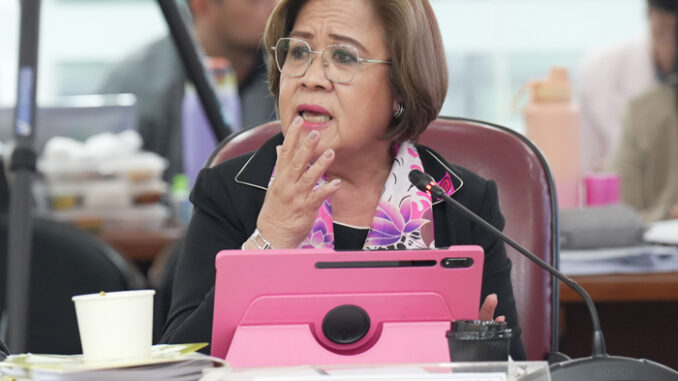
Former Sen. Leila de Lima on Tuesday said former President Rodrigo Duterte could be held liable for crimes against humanity under a 15-year-old Philippine law in connection with the alleged extrajudicial killings (EJKs) that occurred during his administration’s bloody war on drugs.
During the ninth hearing of the House Quad Committee investigating the alleged EJKs linked to the controversial anti-drug campaign, De Lima pointed to Republic Act (RA) 9851, a law enacted in 2009 that defines and punishes crimes against international humanitarian law, genocide, and other crimes against humanity.
She argued that RA 9851, enacted two years before the Philippines became a signatory to the Rome Statute of the International Criminal Court (ICC), covers the systematic killings under Duterte’s drug war.
“The crime of EJKs carried out by state security forces and their agents in the implementation of the war on drugs falls under the general category of ‘other crimes against humanity’ under Section 6, which consists of acts ‘committed as part of a widespread or systematic attack directed against any civilian population, with knowledge of the attack,’” De Lima said, quoting the law.
“These acts include willful killing, extermination, torture, and enforced disappearance, among others,” she added.
De Lima emphasized that under RA 9851, those crimes are non-bailable and could be punished by reclusion perpetua, or life imprisonment.
She added that the law holds not just the direct perpetrators responsible, but also those in leadership positions who order or induce such crimes.
“According to Section 8, a person who orders, solicits or merely induces the systematic attack on the civilian population and which thereafter occurs or is attempted is liable as a principal,” De Lima explained.
“The same applies to anyone who contributes to the commission of the crime by a group of persons acting with a common purpose,” she added.
De Lima further pointed out that RA 9851 does not exempt government officials, including heads of state, from criminal responsibility.
“Section 9 provides that ‘official capacity as a head of state or government shall in no case exempt a person from criminal responsibility under this Act, nor shall it, in and of itself, constitute a ground for reduction of sentence,’” De Lima said.
De Lima stressed that crimes under RA 9851 are not subject to prescription, meaning those responsible can be prosecuted at any time.
“The crimes defined and penalized under this Act, their prosecution, and the execution of sentences imposed on their account, shall not be subject to any prescription,” she said. “Puwede po silang tugisin habambuhay (They can be hunted for life).”
De Lima also noted that the Philippines recognized the authority of international courts like the ICC to prosecute crimes against humanity even before joining the Rome Statute in 2011.
“Through this law, we have recognized the jurisdiction of the ICC over crimes against humanity committed in the Philippines even before we ratified the Rome Statute as a binding treaty,” De Lima said.
She criticized Duterte’s 2018 decision to withdraw the Philippines from the ICC, calling it a move designed to evade accountability for the human rights abuses under his administration.
“Even before we became a member of the ICC, our law already allowed for the surrender or extradition of individuals involved in crimes against humanity to international courts like the ICC,” De Lima said.
She added: “To say we no longer have to cooperate with the ICC, we must first nullify this law. Until then, we are still bound by it.”
De Lima has long been a vocal critic of Duterte and his war on drugs, which resulted in thousands of deaths, many of them suspected EJKs.
In 2017, she was jailed on drug charges that she insists were politically motivated due to her opposition to Duterte. After nearly six years in detention, De Lima was acquitted in all three cases against her.
Despite her incarceration, De Lima has continued to speak out against Duterte’s policies, including his decision to withdraw from the ICC.


Be the first to comment